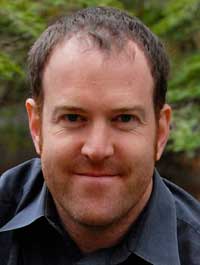Audiobook Excerpt narrated by Roy Samuelson
Bomb: The Race to Build—and Steal—The World's Most Dangerous Weapon |
Audiobook excerpt narrated by Roy Samuelson.
Translate this transcript in the header View this transcript Dark mode on/off
Roy Samuelson: Harry Gold was right. This is a big story. It's the story of the creation and theft of the deadliest weapon ever invented. The scenes speed around the world from secret labs, to commando raids, to street corner spy meetings, but like most big stories, this one starts small. Let's pick up the action 16 years before FBI agents cornered Harry Gold in Philadelphia. Let's start 3000 miles to the west in Berkeley, California on a chilly night in February 1934.
On a hill high above town, a man and woman sat in a parked car. In the driver's seat was a very thin, young physics professor named Robert Oppenheimer. Beside him sat his date, a graduate student named Melba Phillips. The two looked out at the view of San Francisco Bay. It was a fine view, but Oppenheimer couldn't seem to stay focused on the date. He turned to Phillips and asked, "Are you comfortable?" She said she was. "Mind if I get out and walk for a few minutes?" She didn't mind.
Oppenheimer got out and strolled into the darkness. Phillips wrapped a coat around her legs and waited. She waited a long time. At some point, she fell asleep. She woke up in the middle of the night. The seat beside her was still empty. Worried, she stepped onto the road and waved down a passing police car.
"My escort went for a walk hours ago and he hasn't returned," she told the cop. The police searched the park but found nothing. They notified headquarters and a wider search was begun. An officer drove to Oppenheimer's apartment to look for useful clues. He found the professor in bed, sound asleep. The cop shook Oppenheimer awake and demanded an explanation. Oppenheimer said he'd gotten out of the car to think about physics. "I just walked and walked," he said. "And I was home and I went to bed. I'm so sorry."
A reporter for the San Francisco Chronicle got hold of the story and wrote an article with the headline "Forgetful Prof Parks Girl, Takes Self Home". No one who knew Robert Oppenheimer was the least bit surprised.
He had always been different. A girl who knew Robert as a child in New York City described him as "very frail, very pink-cheeked, very shy, and very brilliant". Oppenheimer was a tougher critic, "a repulsively good little boy," he said of himself. "My life as a child did not prepare me for the fact that the world is full of cruel and bitter things."
He was constantly getting sick, so his nervous parents tried to protect him by keeping him inside. While other boys played in the street, Robert sat alone in his room, studying languages, devouring books of literature and science, and filling notebooks with poetry. Around kids his age, he was awkward and quiet, never knowing what to say unless he could bring the conversation around to books. Then he would let loose annoying bursts of learning. "Ask me a question in Latin," he'd say. "And I'll answer you in Greek."
hoping to toughen up their stick-skinny 14 year old, Robert's parents sent him to a sports summer camp, but he was an awful athlete and simply refused to participate. Then the other campers found out he wrote home every day and that he liked poetry and looking for minerals. That's when they started calling him cutie. Robert never fought back. He never even responded. That made his tormentors even angrier.
One night after dinner, Robert went for a walk. A group of boys waited for him in the woods. They grabbed him, dragged him to the ice house, and tossed him on the rough wood floor. They ripped off his shirt and pants, dipped a brush in green paint, and slapped the dripping bristles against his boney body. Robert never said a word about the attack to camp counselors. "I don't know how Robert stuck out those remaining weeks," his only friend at camp later said. "Not many boys would have or could have, but Robert did. It must have been hell for him."
Science saved him. Robert dove deep into chemistry and physics in high school, graduated from Harvard University in 1925, then earned advanced degrees at top universities in Britain and Germany. Even in classes with some of the brightest students in the world, Oppy, as friends called him, never lost his know-it-all style. He interrupted physics lectures with his own theories, sometimes charging to the chalkboard, grabbing the chalk, and declaring, "This can be done much better in the following manner." Classmates got so annoyed, they actually signed a petition asking him to allow others to speak in class. After that, Oppenheimer calmed down, a little bit. "The trouble," a friend said, "is that Oppy is so quick on the trigger intellectually that he puts the other guy at a disadvantage."
This audio excerpt is provided by Books On Tape® / Listening Library.



